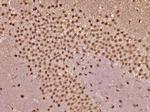Search Thermo Fisher Scientific
FIGURE: 1 / 1
VHLH Antibody (BS-7883R) in IHC (P)

Product Details
BS-7883R
Species Reactivity
Host/Isotype
Class
Type
Immunogen
Conjugate
Form
Concentration
Purification
Storage buffer
Contains
Storage conditions
Shipping conditions
Target Information
Von Hippel-Lindau syndrome (VHL) is a dominantly inherited familial cancer syndrome predisposing to a variety of malignant and benign tumors. A germline mutation of this gene is the basis of familial inheritance of VHL syndrome. The protein encoded by this gene is a component of the protein complex that includes elongin B, elongin C, and cullin-2, and possesses ubiquitin ligase E3 activity. This protein is involved in the ubiquitination and degradation of hypoxia-inducible-factor (HIF), which is a transcription factor that plays a central role in the regulation of gene expression by oxygen. RNA polymerase II subunit POLR2G/RPB7 is also reported to be a target of this protein. Alternatively spliced transcript variants encoding distinct isoforms have been observed.
For Research Use Only. Not for use in diagnostic procedures. Not for resale without express authorization.
References (0)
Bioinformatics
Protein Aliases: elongin binding protein; Protein G7; pVHL; VHL19; VHLp18(MEA); Von Hippel Lindau; von hippel-lindau; von Hippel-Lindau disease tumor suppressor; von Hippel-Lindau syndrome homolog; von Hippel-Lindau syndrome protein homolog; von Hippel-Lindau tumor suppressor, E3 ubiquitin protein ligase
Gene Aliases: HRCA1; pVHL; RCA1; VHL; VHL1; Vhlh
UniProt ID: (Human) P40337, (Mouse) P40338, (Rat) Q64259
Entrez Gene ID: (Human) 7428, (Mouse) 22346, (Rat) 24874

Performance Guarantee
If an Invitrogen™ antibody doesn't perform as described on our website or datasheet,we'll replace the product at no cost to you, or provide you with a credit for a future purchase.*
Learn more
We're here to help
Get expert recommendations for common problems or connect directly with an on staff expert for technical assistance related to applications, equipment and general product use.
Contact tech support
